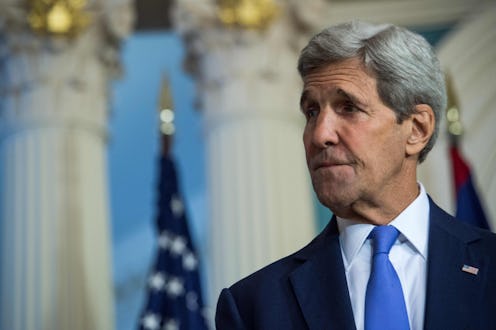U.S. Secretary of State John Kerry announced Sunday the United States will accept thousands more refugees, increasing its annual cap on refugees from 70,000 to 100,000 by 2017. While on a visit to Germany, where he met with other leaders to discuss Europe's migrant crisis, Kerry promised the United States would admit more refugees in the next two years. With much of the crisis happening overseas, it's easy to see the move as one that doesn't affect most Americans, but the announcement is important for more than just the humanitarian aspect of helping Syrian refugees. While refugees from other countries are building new lives for themselves in America, they also bring stories of their experiences, which we, as Americans, can learn from.
To meet its 2017 goal of 100,000 worldwide refugees, the United States will incrementally increase its cap. In the fiscal year 2016, America will give visas to 85,000 refugees and then add another 15,000 on top of the total the following year. His announcement comes after President Obama earlier this month asked his administration to accept at least 10,000 Syrian refugees during the next fiscal year. So far this year, America has taken in just 1,500 Syrian refugees.
"This step ... is in keeping with America's best tradition as a land of second chances and a beacon of hope," Kerry told journalists on Sunday. "And it will be accompanied by continued financial contributions to the humanitarian effort — not only from the U.S. government, but from the American people. The need is enormous, but we are determined to answer the call."
Kerry explained that with the acceptance of more refugees will come stricter background checks to prevent terrorists from entering the United States. Increasing the number of refugees will increase government spending on security procedures, including background checks, but after 9/11, those measures are necessary, Kerry said. According to The Washington Post, bringing in the United States' current annual cap of refugees — 70,000 — cost $1.1 billion this fiscal year. In addition to security measures, the cost also includes programs like orientation services for refugees.
"We want to take more," Kerry told reporters Sunday. "We understand the responsibility. We’d like to. But taking folks out of Syria, post 9/11, requires a very specific vetting process. We can target it. But we don't have the money allocated by Congress to hire people necessary to do the job. We’re doing what we know we can manage immediately."
Some human rights workers, though, think the United States still isn't doing enough to help refugees. Eleanor Acer, director of the advocacy group and refugee protection program Human Rights First, told The New York Times that Kerry's "piecemeal" approach is "simply not enough to effectively address this crisis," which she referred to as "the largest refugee crisis since World War II." Kerry, meanwhile, blames the Congressional budget for the United States' refugee number not being higher.
It's important to remember, though, that accepting refugees isn't a one-way street for America. Yes, there are the initial costs of bringing them into the country — the security measures and orientation programs are a significant chunk of Congress' budget. But the Post notes that of the roughly one dozen Syrian refugees Kerry met with, the refugees were from a variety of backgrounds and career goals, and many of them fell into the "educated middle class" category. Some of the refugees included journalists, publishers, and university professors — imagine the enrichment and perspectives they'd bring to, say, discussions in newsrooms or college classrooms in the United States.
Of course, there's much more work to be done to help global refugees. Some of the migrants Kerry met with suggested the United States work toward permanent solutions, including ousting ISIS from Syria. Still, it's great that Kerry is fighting for America to help more refugees, especially since Europe is struggling to shelter its refugees. Let's hope Congress helps Kerry achieve his goal of making America a "beacon of hope" for those in need.
